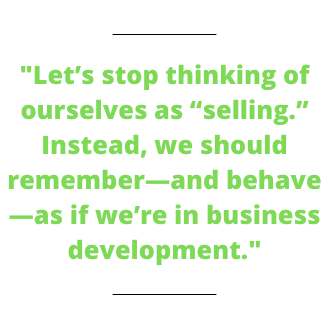Why “Consultative Selling” Is A Fallacy

You work in promotional products. You’re responsible for revenue. You provide solutions that help your clients sell more of their products or solutions, or keep their people happy.
So you must be in sales, right? Or your job function includes, at least in part, selling.
Here’s what I mean.
Sales Is a Game
The act of selling suggests roles and rules. Like a game. There’s a pitcher and a catcher. The seller has a role and is expected to engage in well understood, typical behaviors. The buyer has a role, too. They’re also expected to engage in well understood, typical behaviors. And these roles—sometimes I refer to them as “dance steps”—are going to lead to expected outcomes that work to the disadvantage of the seller. And they might even provide less value and a less ideal outcome for the buyer.
“Sales” suggests “a transaction.” The goal of the seller is to generate revenue for the seller’s agency. The seller has a prescribed process. The goal is to close the sale. The buyer is aware of this, and therefore will focus the relationship on the attributes of the solution and on price. The Game is on.
The Fallacy of “Consultative Selling”
Years and years of sales training has conditioned many or most agencies to take what they think is a consultative approach. Its hallmark is the opening of an initial meeting like this:
- First, some small talk.
- Then, a few “discovery questions” designed to get right the needs of the buyer.
- Next, a presentation of the solution.
- Now, let’s talk about price.
- Finally, comments or questions that are designed to close the sale.
Decision makers recognize these steps immediately. And it drives them even deeper into their roles as buyers. They will focus on the feature or benefits of the product, looking not just to understand them, but to diminish the perception of value of those features. Yes, they might be attracted to the solution, and even prepared to buy it. But by steering the conversation in this direction, they create the perception that they’re not that into it. And, thus, they have a platform to reduce price and/or get concessions from the seller. The buyer knows the seller will be open to these concessions, because the buyer knows that the seller wants to close the sale.

We’ve had decision makers tell us bluntly, “I can’t stand it when they use their consultative selling training on me.”
It’s kind of like how it was for many of us who bought or leased cars before the current supply chain issues. The salesman presents the features of the car and we respond.
“It has a 360-degree camera.” That sounds like an expensive gimmick to me.
“It’s rated in the top five for safety.” I’m looking at all those cars. They seem equally safe to me.
“We have a six-year warranty.” I only intend to keep the car three years.
“It has 18 cu ft of storage room.” We very rarely fill the trunk of the car we now have.
Look, sales can lead to a deal, which is revenue for your agency. In the process, you had to engage in this dance, play by these rules. Buyers will be motivated to get the best deal possible for themselves. You’ll be motivated to negotiate the hell out of the deal so you can close the sale. Maybe both sides are satisfied. That satisfaction will last only until the next product or the next cycle, when the whole thing starts over again.
The Better Way to Build Revenue
Let’s stop thinking of ourselves as “selling.” Instead, we should remember—and behave—as if we’re in business development. The difference is more than semantics.
“Business development” is strategic. The business developer builds a trusted advisor relationship with the prospect. They show a deep level of care for the business (and perhaps personal) welfare of the prospect. There is no distinct “close.” Instead, the relationship unfolds to make agreement to proceed seem organic. They buyer is not primarily concerned about solution attributes or price. The buyer believes the business developer’s agency is uniquely suited to provide needed help.
 This pivot is propelled not by the product or service being offered, or by clever questions designed to close the sale. Instead, it relies heavily on:
This pivot is propelled not by the product or service being offered, or by clever questions designed to close the sale. Instead, it relies heavily on:
- Powerful insights from the agency that provide value to decision-makers long before there’s a discussion of solutions and price.
- Exceptional listening and probing skills to learn more about the person, their motivations and values.
- Determination to bring value to every prospect contact. Every touch point, from the first bit of marketing communication to the signed contract, is oriented to be about the prospect, not the agency.
Business development will get you the revenue you want. It will do so without emphasizing transactions, but instead emphasizing prospect challenges and opportunities. You won’t have to lower your price as much as you’ve often done. Deals will get done not because you negotiated agreement, but because you offered something which met the real needs of the prospect.
Bob Wiesner is managing partner, Americas, of The Artemis Partnership, a global consultancy focused on helping its clients improve the results of their business development efforts. Wiesner has been working in this area for over 25 years. He’s the author of Winning Is Better: The Journey to New Business Success

